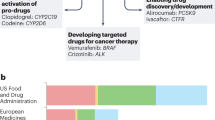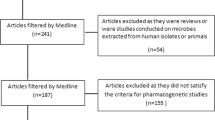Abstract
It is increasingly recognized that the clinical utility of a pharmacogenomic marker is a fundamental characteristic influencing the likelihood of successful clinical translation. Although appropriately designed and executed randomized controlled trials generally provide the most valid evidence for the clinical utility of a pharmacogenomic marker, such evidence may not always be available. Observational pharmacogenomic association studies are a common form of evidence available, but the assessment of clinical utility based on such evidence is often not straightforward. This paper aims to provide insight into this issue using a range of illustrative examples.
This is a preview of subscription content, access via your institution
Access options
Subscribe to this journal
Receive 6 print issues and online access
$259.00 per year
only $43.17 per issue
Buy this article
- Purchase on Springer Link
- Instant access to full article PDF
Prices may be subject to local taxes which are calculated during checkout



Similar content being viewed by others
References
Hingorani AD, DAvd Windt, Riley RD, Abrams K, Moons KGM, Steyerberg EW et al. Prognosis research strategy (PROGRESS) 4: stratified medicine research. BMJ 2013; 346: e5793.
Sorich MJ, McKinnon RA . Personalized medicine: potential, barriers and contemporary issues. Curr Drug Metab 2012; 13: 1000–1006.
Lesko LJ, Zineh I, Huang SM . What is clinical utility and why should we care? Clin Pharmacol Ther 2010; 88: 729–733.
Teutsch SM, Bradley LA, Palomaki GE, Haddow JE, Piper M, Calonge N et al. The evaluation of genomic applications in practice and prevention (EGAPP) initiative: Methods of the EGAPP working group. Genet Med 2009; 11: 3–14.
McKinnon RA, Ward MB, Sorich MJ . A critical analysis of barriers to the clinical implementation of pharmacogenomics. Ther Clin Risk Manag 2007; 3: 751–759.
Meckley LM, Neumann PJ . Personalized medicine: factors influencing reimbursement. Health Policy 2010; 94: 91–100.
Paci D, Ibarreta D . Economic and cost-effectiveness considerations for pharmacogenetics tests: An integral part of translational research and innovation uptake in personalized medicine. Curr Pharmacogenomics Person Med 2009; 7: 284–296.
Oldenhuis CNAM, Oosting SF, Gietema JA, de Vries EGE . Prognostic versus predictive value of biomarkers in oncology. Eur J Cancer 2008; 44: 946–953.
Baigent C, Keech A, Kearney PM, Blackwell L, Buck G, Pollicino C et al. Efficacy and safety of cholesterol-lowering treatment: prospective meta-analysis of data from 90,056 participants in 14 randomised trials of statins. Lancet 2005; 366: 1267–1278.
Mandrekar SJ, Sargent DJ . Clinical trial designs for predictive biomarker validation: theoretical considerations and practical challenges. J Clin Oncol 2009; 27: 4027–4034.
Patterson SD, Cohen N, Karnoub M, Truter SL, Emison E, Khambata-Ford S et al. Prospective–retrospective biomarker analysis for regulatory consideration: white paper from the industry pharmacogenomics working group. Pharmacogenomics 2011; 12: 939–951.
Simon RM, Paik S, Hayes DF . Use of archived specimens in evaluation of prognostic and predictive biomarkers. J Natl Cancer Inst 2009; 101: 1446–1452.
Karapetis CS, Khambata-Ford S, Jonker DJ, O'Callaghan CJ, Tu D, Tebbutt NC et al. K-ras mutations and benefit from cetuximab in advanced colorectal cancer. N Engl J Med 2008; 359: 1757–1765.
Bokemeyer C, Cutsem EV, Rougier P, Ciardiello F, Heeger S, Schlichting M et al. Addition of cetuximab to chemotherapy as first-line treatment for KRAS wild-type metastatic colorectal cancer: Pooled analysis of the CRYSTAL and OPUS randomised clinical trials. Eur J Cancer 2012; 48: 1466–1475.
Chapman PB, Hauschild A, Robert C, Haanen JB, Ascierto P, Larkin J et al. Improved survival with vemurafenib in melanoma with BRAF V600E mutation. N Engl J Med 2011; 364: 2507–2516.
Paik S, Tang G, Shak S, Kim C, Baker J, Kim W et al. Gene expression and benefit of chemotherapy in women with node-negative, estrogen receptor-positive breast cancer. J Clin Oncol 2006; 24: 3726–3734.
Holmes MV, Perel P, Shah T, Hingorani AD, Casas JP . CYP2C19 genotype, clopidogrel metabolism, platelet function, and cardiovascular events: a systematic review and meta-analysis. JAMA 2011; 306: 2704–2714.
Sorich MJ, Vitry A, Ward MB, Horowitz JD, McKinnon RA . Prasugrel vs. clopidogrel for cytochrome P450 2C19-genotyped subgroups: integration of the TRITON-TIMI 38 trial data. J Thromb Haemost 2010; 8: 1678–1684.
Sorich MJ, Polasek TM, Wiese MD . Systematic review and meta-analysis of the association between cytochrome P450 2C19 genotype and bleeding. Thromb Haemost 2012; 108: 199–200.
Wallentin L, James S, Storey RF, Armstrong M, Barratt BJ, Horrow J et al. Effect of CYP2C19 and ABCB1 single nucleotide polymorphisms on outcomes of treatment with ticagrelor versus clopidogrel for acute coronary syndromes: A genetic substudy of the PLATO trial. Lancet 2010; 376: 1320–1328.
Sorich MJ, Polasek TM, Wiese MD . Challenges and limitations in interpretation of systematic reviews: making sense of clopidogrel and CYP2C19 pharmacogenetics. Clin Pharmacol Ther 2013; 94: 376–382.
Topol EJ, Damani SB . The KIF6 Collapse. J Am Coll Cardiol 2010; 56: 1564–1566.
Sorich M, Wiese M, O’Shea R, Pekarsky B . Review of the cost effectiveness of pharmacogenetic-guided treatment of hypercholesterolaemia. Pharmacoeconomics 2013; 31: 377–391.
Iakoubova OA, Robertson M, Tong CH, Rowland CM, Catanese JJ, Blauw GJ et al. KIF6 Trp719Arg polymorphism and the effect of statin therapy in elderly patients: results from the PROSPER study. Eur J Cardiovasc Prev Rehabil 2010; 17: 455–461.
Assimes TL, Hólm H, Kathiresan S, Reilly MP, Thorleifsson G, Voight BF et al. Lack of association between the Trp719Arg polymorphism in kinesin-like protein-6 and coronary artery disease in 19 case-control studies. J Am Coll Cardiol 2010; 56: 1552–1563.
Celera Says Case-control Publication on KIF6 Does Not Refute Prior Research on KIF6’s Association with Coronary Heart Disease and Statin Benefit [Press release] 2010. www.celera.com/celera/pr_1286482527.
Khoury MJ, Berg A, Coates R, Evans J, Teutsch SM, Bradley LA . The evidence dilemma in genomic medicine. Health Aff (Millwood) 2008; 27: 1600–1611.
Chen P, Lin JJ, Lu CS, Ong CT, Hsieh PF, Yang CC et al. Carbamazepine-induced toxic effects and HLA-B*1502 screening in Taiwan. N Engl J Med 2011; 364: 1126–1133.
French B, Joo J, Geller NL, Kimmel SE, Rosenberg Y, Anderson JL et al. Statistical design of personalized medicine interventions: the Clarification of Optimal Anticoagulation through Genetics (COAG) trial. Trials 2010; 11: 108.
van Schie RM, Wadelius MI, Kamali F, Daly AK, Manolopoulos VG, de Boer A et al. Genotype-guided dosing of coumarin derivatives: the European pharmacogenetics of anticoagulant therapy (EU-PACT) trial design. Pharmacogenomics 2009; 10: 1687–1695.
Zujewski JA, Kamin L . Trial assessing individualized options for treatment for breast cancer: the TAILORx trial. Future Oncol 2008; 4: 603–610.
Cardoso F, Van't Veer L, Rutgers E, Loi S, Mook S, Piccart-Gebhart MJ . Clinical application of the 70-gene profile: the MINDACT trial. J Clin Oncol 2008; 26: 729–735.
Sorich MJ, Coory M, Pekarsky BAK . Indirect estimation of the comparative treatment effect in pharmacogenomic subgroups. PLoS One 2013; 8: e72256.
Punglia RS, Burstein HJ, Winer EP, Weeks JC . Pharmacogenomic variation of CYP2D6 and the choice of optimal adjuvant endocrine therapy for postmenopausal breast cancer: a modeling analysis. J Natl Cancer Inst 2008; 100: 642–648.
Woods B, Veenstra D, Hawkins N . Prioritizing pharmacogenetic research: a value of information analysis of CYP2D6 testing to guide breast cancer treatment. Value Health 2011; 14: 989–1001.
Acknowledgements
We thank Brita Pekarsky for her contributions to discussions of the concepts that have been summarized in this manuscript. Financial support for this study was provided by a grant from the National Heart Foundation of Australia (grant number G11A5902) and the National Health and Medical Research Council of Australia (grant number 1028492).
Author information
Authors and Affiliations
Corresponding author
Ethics declarations
Competing interests
The authors declare no conflict of interest.
Rights and permissions
About this article
Cite this article
Sorich, M., Coory, M. Interpreting the clinical utility of a pharmacogenomic marker based on observational association studies. Pharmacogenomics J 14, 1–5 (2014). https://doi.org/10.1038/tpj.2013.35
Received:
Revised:
Accepted:
Published:
Issue Date:
DOI: https://doi.org/10.1038/tpj.2013.35
Keywords
This article is cited by
-
Assessment of clinically actionable pharmacogenetic markers to stratify anti-seizure medications
The Pharmacogenomics Journal (2023)
-
How are we evaluating the cost-effectiveness of companion biomarkers for targeted cancer therapies? A systematic review
BMC Cancer (2021)
-
The Routine Clinical use of Pharmacogenetic Tests: What it Will Require?
Pharmaceutical Research (2017)



